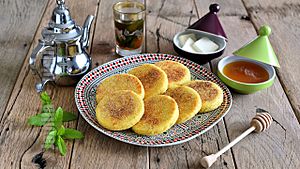Harcha facts for kids

Moroccan Harcha served with Moroccan mint tea, fresh cheese, and honey
|
|
| Type | Flatbread |
|---|---|
| Place of origin | Morocco |
| Main ingredients | Semolina flour, butter, water or milk, baking powder |
Harcha (Arabic: حرشة, romanized: ḥarša) is a special type of flatbread. It is cooked on a hot griddle or pan. This tasty bread comes from the Middle Atlas mountains in Morocco. You can also find it in Algeria. Harcha is made mostly from semolina flour, which gives it a unique texture.
How Harcha is Made
Harcha cakes are made from a simple dough. The main ingredients are semolina, butter, and milk or water. A little baking powder is added to help the bread rise. Sometimes, a bit of sugar is also mixed in for taste.
After mixing, the dough is shaped into round cakes. These rounds are then cooked on a hot griddle or a flat pan. Using semolina flour makes harcha crumbly. This texture is a bit like cornbread.
In a region of Morocco called Rif, people sometimes use buttermilk or yogurt instead of milk. They thin it with water first. Harcha can be made in different sizes. Some are small, like a cookie, while others can be very large.
How People Enjoy Harcha
Harcha is often eaten for breakfast or as a snack. People usually spread honey and butter on it. It is commonly served with mint tea.
Harcha is also one of the breads enjoyed during Ramadan. You can even use it like a sandwich. It can be stuffed with cheese or meat confit. Sometimes, harcha is crumbled up. This makes a soft bed for a stew.
Different Kinds of Harcha
The name for this bread can change in different parts of Morocco and Algeria. For example, some people might call a similar bread "mbesses." However, "mbesses" can also be a sweet cake found in Algeria. That cake is called Khobz Mbesses. It has similar ingredients but is not exactly the same as harcha.
In the late 1800s, bakers from Algeria moved to Fes, Morocco. They introduced a bread called El Khobz El Harcha. This bread was made by sprinkling semolina on top before baking. This is different from Harcha, which is made entirely from semolina flour.
In the countryside near Algiers, Harcha is often called harchâya. In other parts of Algeria, people might use the term ragda for it.
See also
 In Spanish: Harcha para niños
In Spanish: Harcha para niños
 | Madam C. J. Walker |
 | Janet Emerson Bashen |
 | Annie Turnbo Malone |
 | Maggie L. Walker |

